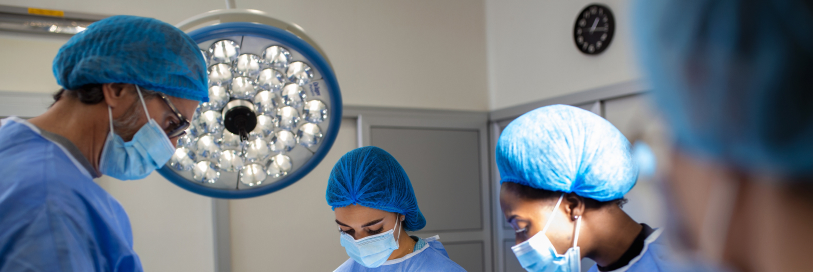Medical Malpractice Lawyer in Columbia, SC

Have you or a loved one suffered severe harm due to the negligence of a medical professional in Columbia, S.C.? If so, you may be entitled to considerable compensation due to the harm you’ve suffered and the breach of the professional’s duty of care owed to you under the law.
Legally actionable medical negligence is often referred to as medical malpractice. Medical malpractice is an area of law that covers a wide range of mistakes and omissions, including misdiagnosis or delayed diagnosis, anesthesia mistakes, surgical errors, birth injuries, prescription and medication errors, and more. To get the justice and compensation you deserve, you’ll want to speak with an experienced medical malpractice lawyer as soon as you can.
The Columbia medical malpractice lawyer at the Law Offices of S. Chris Davis has what it takes to make a difference for you. Attorney Chris Davis and his support staff understand how devastating it can be to suffer harm due to medical negligence. You trusted that you would receive responsible, effective medical care, and instead suffered harm due to the carelessness of someone you placed your faith in. Fortunately, the law allows you to hold the at-fault party accountable, and we’re ready to work hard at securing a favorable outcome for your case.
If you either know or suspect that you are a victim of medical malpractice, don’t wait until it is too late to take action. Contact a Columbia medical malpractice lawyer at the Law Offices of S. Chris Davis for a free case evaluation right away.
What Constitutes Medical Malpractice?
Not every situation in which a patient is injured as a result of medical treatment is evidence of medical malpractice. Medical malpractice occurs only when a medical provider improperly fails to provide care or provides care to a patient that fails to meet acceptable legal and professional standards, and the patient was harmed because of that substandard care.
While the specifics of the standard of care vary according to the circumstances of each patient’s case, the law broadly defines an acceptable standard of care as the treatment actions and decisions that other reasonably competent healthcare professionals of similar training and experience would make under similar circumstances. Thus, medical malpractice law does not seek to impose liability on a healthcare provider when other reasonably competent professionals would have taken the same approach, had they stood in the treating professional’s place, even if the patient has a negative outcome as a result of their care or lack of care.
What Are Some Common Examples of Medical Malpractice in Columbia?
Examples of errors that may occur due to medical malpractice include:
- Misdiagnosis, or failing to get the correct diagnosis
- Delayed diagnosis, failing to timely reach the correct diagnosis
- Emergency room errors, including failure to triage a patient, inadequate patient history and physical exam, and premature discharge
- Surgical errors, including wrong site/wrong patient/wrong procedure errors, leaving equipment inside a patient, and substandard post-surgical care
- Anesthesia errors, including giving too much or too little anesthesia, or failing to properly monitor the patient’s condition during surgery
- Medication errors, including prescribing contraindicated medication, miscalculating the dosage, errors in filling a prescription, or giving medication to the wrong patient
- Lack of infection control and sanitation leading to hospital-acquired infections
- Birth injuries, which may be caused by negligent prenatal care or improper actions during delivery that causes injury to mother and/or child
- Failure to obtain informed consent
Compensation in a Medical Malpractice Case
When medical malpractice cases are successful, victims may be entitled to obtain compensation for expenses and losses incurred because of the injuries or physical harm they suffered as a result of substandard care. A favorable settlement or verdict in your medical malpractice case could potentially provide you with financial recovery for:
- Past medical expenses and future medical costs for additional care needed to treat the injuries or conditions caused by negligent treatment
- Loss of wages or income from work missed during recovery
- Loss of future earning ability if the injuries or harm inflicted by substandard care impairs your ability to return to gainful employment
- Physical pain and emotional trauma or distress
- Reduced enjoyment and quality of life due to permanent disability, permanent disfigurement, scarring, or reduced life expectancy
Is There a Cap on Medical Malpractice Awards in South Carolina?
Under the South Carolina Noneconomic Damage Awards Act of 2005, medical malpractice claimants are limited in the amount of compensation they may be awarded for noneconomic losses (such as pain and suffering or lost quality of life).
In a medical malpractice claim against a single healthcare facility, a claimant is limited to $350,000 in noneconomic compensation. For claims against two or more facilities or individual healthcare professionals, a claimant can recover up to $350,000 in noneconomic compensation from each facility or provider, up to an aggregate total of $1.05 million.
However, the Act lists several exceptions to this cap, including:
- Medical malpractice arising from gross negligence, recklessness, or willful or wanton conduct
- Cases in which a liable medical provider engaged in fraud or misrepresentation
- Cases in which a medical provider or facility altered or destroyed medical records for the purpose of avoiding liability
What Must You Prove in a Medical Malpractice Lawsuit?
To successfully recover compensation via a medical malpractice lawsuit, you will need to present evidence which shows that your healthcare providers rendered treatment to you that fell below the requisite standard of care that applies to your case. Critical evidence in medical malpractice claims often includes:
- Medical records, including provider and nursing notes
- Staffing and administrative records from the healthcare facility where the negligent care took place
- Surveillance camera footage
- Eyewitness testimony
Most importantly, your medical malpractice case will likely benefit from opinion testimony from a medical expert. This expert should be a professional in the same or similar specialty as the provider who negligently injured you. They must also be in a strong position to provide an opinion as to the applicable standard of care in your treatment, how your provider’s care fell below that standard, and how you were harmed as a result of the provider’s substandard approach to care.
Process for Filing Medical Malpractice Lawsuit in South Carolina
Filing a medical malpractice lawsuit in South Carolina is a complex process that involves specific requirements that don’t apply to other injury cases. Before a medical malpractice lawsuit can be filed in court, you will need to send a Notice of Intent to File Suit to each healthcare professional or facility that you intend to name as a defendant in your lawsuit.
This notice must include an affidavit authored by a medical expert. In the affidavit, the expert must certify that they have reviewed your medical records and other evidence and can opine, to a reasonable degree of medical certainty, that medical negligence occurred in your case and that your legal claim has merit.
After you send your notices of intent to the parties you intend to sue, you must attend a mediation conference with these parties. The conference is intended to give the parties the opportunity to try to reach a settlement without involving a judge or jury
If a settlement cannot be reached at the mediation conference, you can then file your lawsuit to pursue your case in court. Chris Davis can represent your interests at each step along this journey.








